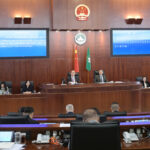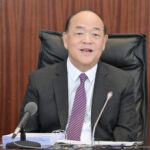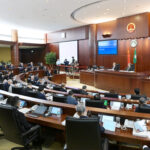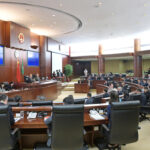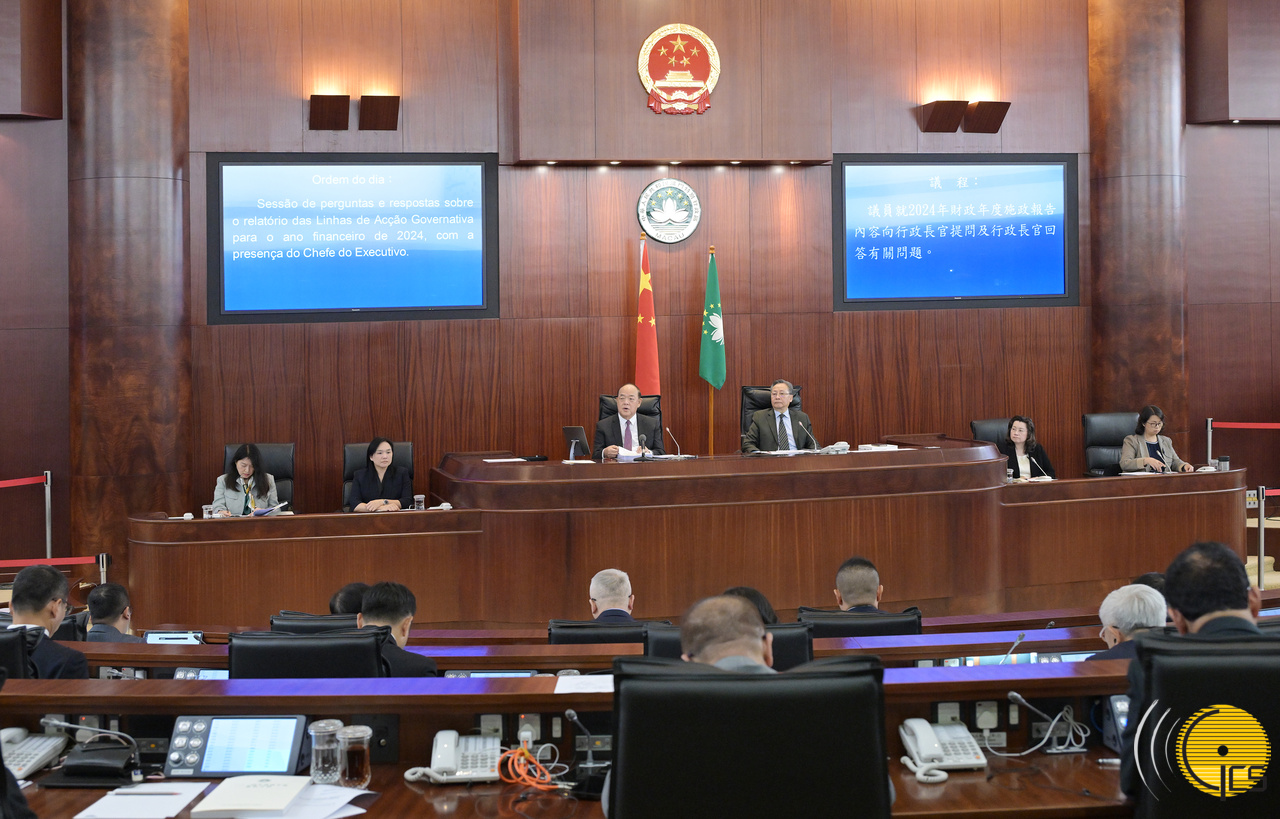 The Chief Executive, Mr Ho Iat Seng, attends a plenary session of the Legislative Assembly to answer questions raised by Legislative Assembly members concerning the Policy Address for the Fiscal Year 2024.
The Chief Executive, Mr Ho Iat Seng, attends a plenary session of the Legislative Assembly to answer questions raised by Legislative Assembly members concerning the Policy Address for the Fiscal Year 2024.
During a question-and-answer session at the Legislative Assembly on Wednesday (15 November), the Chief Executive, Mr Ho Iat Seng, stated that the Government continued to be committed to revitalising the economy at community level, and to stimulating small and medium-sized enterprises (SMEs) to improve the quality and quantity of their development. At the same time, in order to support the “Development Plan for Appropriate Economic Diversification of the Macao Special Administrative Region (2024-2028)”, the Government was making every effort to promote the construction of the Guangdong-Macao Intensive Cooperation Zone in Hengqin: all tasks were being implemented in an orderly manner, and a number of services related to supporting people’s well-being in Hengqin were being implemented to align the mode of life there with that in Macao.
Mr Ho pointed out that – before considering introducing specific support measures – the Government must adhere to the principle of prudent financial management. It had gone through many rounds of studies and evaluations, and had reduced expenditure in many aspects, prior to achieving a balance in next year’s budget between fiscal revenue and expenditure. It was a very prudent budget with a very limited surplus. Mr Ho noted that, as mandated by the relevant law, only when there was a budget surplus was it possible to resume the system of injecting into the Non-Mandatory Central Provident Fund account of each eligible Macao resident an additional cash sum of 7,000 patacas. In order to avoid a budget deficit, the Government had adjudged there were not suitable conditions under which to launch a fresh electronic consumption benefits plan.
Regarding the business situation of SMEs in the community, Mr Ho said that Macao’s economy had now recovered to about 70 percent of the level in 2019, and so there was still room for improvement. At present, not all commercial enterprises might be able to benefit from the trend of economic recovery. The Government understood the situation faced by SMEs. Therefore, it had coordinated with the banking industry to extend the “interest repayment without principal repayment” measure and the "adjustment of loan repayment plans for small and medium enterprises" measure until the end of 2024, to assist SMEs. At the same time, the Government had vigorously promoted non-gaming elements, and revitalised six historic areas, aiming to stimulate the economy at community level. In some community areas, small, medium-sized, and micro enterprises were already experiencing improvements in business. The Government had also provided multifaceted support – and launched a number of supportive policies – to assist SMEs, namely in publicity and promotion, in enhancing their visibility, and in expanding the sources of their customers. The Government would continue to help convert SMEs’ online traffic into offline sales, attracting more people to become their customers.
In terms of promoting the development of the digital economy, Mr Ho said the current administration was focusing on promoting the digitisation of payment systems. Since the introduction of a new electronic payment system in 2020, 80 percent to 90 percent of merchants in Macao had adopted electronic payment. The Government was also actively conducting research on the promotion of digital currency. The new law regulating issuance of currency came into effect on 1 September. It provided a legal basis for the promotion of digital currency, and Macao would draw on the mainland's experience in relation to gradual implementation of it. However, as Macao's small economy would not be able to withstand the impact of any sudden shock, the Government would only consider the implementation of digital currency after ensuring the safety and stability of all elements relating to its use, and reaching a consensus with the banking industry.
In terms of expanding tourist sources, Mr Ho pointed out that the Government continued to carry out large-scale tourism promotion work at home and abroad. During this period, it had chosen to place advertisements with highly effective platforms. This had achieved remarkable results, helping Macao become the primary outbound-tourism destination for mainland residents in the first half of the year. The Government hoped that the Macao tourism industry would further explore cooperation with mainland promotional platforms. Based on the convenience of direct flights, the promotion focus regarding tourism from overseas would continue to be on Northeast and Southeast Asia. It was also hoped that the overseas Chinese community in Macao would continue to play a key role in joint promotion efforts to attract to Macao a greater number of tourists from various countries and regions.
In addition, Macao’s convention and exhibition industry continued to recover, as various events had successively been held in Macao. This had provided a large number of job opportunities, boosting the economy in an effective way, and driving the development of the industry. At the same time, Macao hoped to promote "medical+tourism" business, to expand overall the number of tourists visiting Macao. The Islands District Medical Complex - Macao Medical Centre of Peking Union Medical College Hospital was being equipped with an excellent medical team and the world's most advanced equipment. Leveraging on Macao’s advantages in the field of medical drug importation, and the benefits offered by the Guangdong-Hong Kong-Macao Greater Bay Area, it would provide strong support for the development of high-end medical tourism in Macao.
Regarding the development of the Guangdong-Macao Intensive Cooperation Zone in Hengqin, Mr Ho pointed out that tasks were being completed in an orderly manner, and a number of services relating to people's well-being had been implemented, including expanding the capabilities of the “Macao One Account” system, with the addition of an ‘appointment for counter service’ function for many public services handled by the Government Affairs Service Centre within the Cooperation Zone. The Financial Services Bureau had set up self-service kiosks in the Cooperation Zone, and the Identification Services Bureau had also launched self-service kiosks to promote the integration of community life between Macao and Hengqin. At the same time, the Macao New Neighbourhood project had opened show flats for the public to view. The step attracted about 8,000 people in the first week. The neighbourhood offered a variety of facilities; the community management approach was in accordance with the Macao model; the television and telecommunications networks were the same as those in Macao; the transportation arrangements were convenient; and the living environment was similar to Macao. Mr Ho encouraged Macao residents currently living in Zhuhai and Zhongshan to visit the Cooperation Zone and the Macao New Neighbourhood project.
Other Macao policies would be extended to the Cooperation Zone, including free education and senior citizen services, and medical drugs imported to Macao would also be used in medical treatments there. In addition, for the convenience of those living there, the Government was discussing with the relevant counterparts the implementation of measures to allow foreign domestic workers employed by Macao residents to be able to work in the Cooperation Zone. Mr Ho stated that there were currently no tertiary education institutions in the Cooperation Zone. In order to support the development needs of the Cooperation Zone, the Government planned to open some there. Approval for that was pending. Private universities already operating in Macao were welcome to apply to set up tertiary education institutions in the Cooperation Zone.
With regards to high-quality cooperation between Macao and the mainland, Mr Ho pointed out that the Government continued to strengthen exchanges and cooperation with various provinces, autonomous regions, and municipalities on the mainland. A number of cooperation mechanisms had been established and were operating smoothly. They included steps continuously to deepen the development of industrial ties of mutual benefit. Worthwhile results had been achieved.
During the question-and-answer session, Mr Ho took questions from a total of 31 members of the Legislative Assembly. Other topics discussed included care for the elderly, steps to increase the birth rate, medical and healthcare services, urban planning, the transportation system, social housing pricing, the technology and innovation sectors, employment, labour relations, talent cultivation and import, Internet security, consumer rights, preparations for the National Games, patriotic education, operations of consulting organisations, mental health, education, and market prices.


